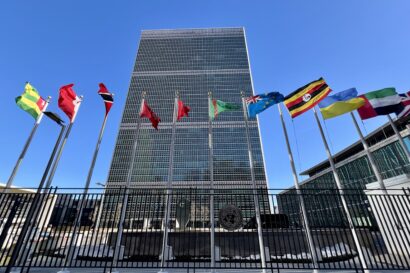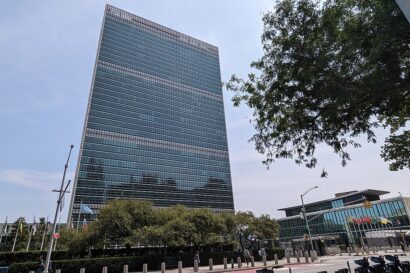Hour for hour, day for day, the world is changing due to the rapid spread of the coronavirus (Covid-19). Every area of social action is affected by the increasing restrictions being placed on citizens around the world through isolation and quarantines, posing profound problems for economies and policy-makers. Global negotiations over a new resolution to the tax challenges of digitalisation are, of course, no exception.
For developing countries, Covid-19 presents a real and serious risk that their views and interests could be marginalised in global negotiations over digital taxation. So far, the global discussions at the OECD have proceeded with a focus on the secretariat’s “unified proposal” under Pillar One, and on a global minimum tax solution under Pillar Two, all taking place in the shade of high-profile transatlantic disagreement between Europe and the US. However, in a context where negotiations remain uncertain and highly contested, the virus will change the practical means of discussion, shift short-term political attention away, and present unique and severe challenges for developing countries to participate in shaping a sustainable global consensus. On top of these practical challenges, a new fiscal politics emerging from the coronavirus pandemic threatens to waylay the ambitious schedule put forward by the OECD.
Covid-19: Changing the format, shifting political attention, and straining capacities
The effects of the virus on the practical process of global tax negotiations is likely to have two key manifestations:
First, with in-person meetings increasingly discouraged, the practical circumstances of the discussions are changing. Instead, both small and large meetings with country representatives are proceeding via video conferences. The OECD has assured that its “working methods will be adapted to allow all countries to fully participate.”Still, this offers an unprecedented challenge to both the secretariat and individual countries, as they seek to replace the extensive interactions, made possible by face-to-face meetings, which provide the basis for negotiations towards a new global tax consensus.
Second, as the policymakers around the world focus on responding to the pandemic, lower levels of political attention is likely to work against the OECD/G-20 project. So far, Covid-19 has fostered strong state intervention across the world, with governments mobilising their entire policy capacity for the pandemic. This may mean countries can invest fewer resources into the digital tax project, as key officials are directed elsewhere to work on virus-related policy initiatives. Indeed, multiple stakeholders have already called for delaying the global tax negotiations to allow a focus on crisis response. These issues will affect all countries, as well as other stakeholders, but will be especially challenging for developing countries, who have less capacity to manage both domestic crisis responses and global tax negotiations. The end result may be slower or more shallow discussions.
However, the current situation – where citizens are increasingly forced to rely on online and digital services for remote work and leisure due to isolation and quarantines – only serves to underscore the urgency of the OECD/G-20 digital tax project and the problem of taxing those same services. So far, the OECD has indicated that the schedule for discussions is unaffected by the pandemic, and that the Inclusive Framework continues to work towards high-level political agreement by July.
What will these changes mean for developing countries?
New dynamics of participation
In practical terms, where developing countries face unique challenges in participating in global tax negotiations, the move towards online meetings offers both opportunities and challenges. On one hand, in theory videoconferencing mitigates some of the costs typically associated with participation, most centrally travel and time costs. Non-OECD countries have become more strongly represented in the key fora, such as the Inclusive Framework’s Steering Group, though there remains room for more effective participation. On the other hand, videoconferencing limits the extent of personal interactions, thus potentially re-enforcing established patterns of authority and power in negotiations. This may well compound existing inequalities in influence, where negotiators from developing countries face asymmetries in both available information and high-level political support. Moreover, videoconferencing requires sufficient IT equipment and connection infrastructure to allow representatives to participate, which has already proven challenging for some developing countries. Time differences, similarly, place a strain on geographically dispersed delegations to meet and discuss effectively.
New revenue needs
More fundamentally, the outbreak of the virus will certainly shift the interests and preferences of governments in digital tax negotiations, as economic and political circumstances change. Already we are seeing governments radically mobilising their tax systems to fight an oncoming economic crisis, putting pressure on the national fiscal capacity. This could potentially raise the dilemma for governments in global tax negotiations of ensuring contributions from digital businesses that are profiting from a crisis that is pushing millions of users to online services, while tempering political appetite for increasing taxes (which would almost certainly be the outcome of any G-20/OECD agreement) during or after an economic crisis.
Developing countries are likely to be particularly hard hit once the virus takes hold outside of Europe and Asia, given comparably limited resilience in local health and fiscal systems. This will foster acute and substantial additional revenue needs, especially as many developing countries rely heavily on corporate income taxes, which are amongst the most cyclical of taxes, as well as trade taxes, which could be massively affected as the global economy slows and global supply chains come apart. Thus, developing countries stand to be far more negatively affected by any global economic downturn and associated shortfalls in sorely-needed revenue.
New policy dilemmas
As such, the corona crisis could lead to even stronger demands for meeting developing country needs and interests in global negotiations over taxing the digital economy, especially on the OECD’s Pillar Two, the global minimum tax, which could provide the more significant revenue boost to low-income countries according to the OECD’s economic analysis. Here, the rule order – the hierarchy of the proposed income inclusion rule, which would likely allocate more revenue to capital-exporting residence countries, and the tax on base-eroding payments, which would likely allocate more revenue to capital-importing countries – remains undecided. If developing countries do not expect significant revenue gains from a new global tax deal – a risk that Covid-19 substantially increases – they are more likely to pursue unilateral measures. This could include digital services taxes or withholding taxes, but also other radical initiatives such as re-introducing capital controls.
For now, as the virus spreads across the globe and takes its toll, the global negotiations are moving forward. The months ahead will be critical in shaping a new deal for addressing the tax challenges of digitisation, and we could have a rough outline of a final agreement by July, when the Inclusive Framework has its key summer meeting. How the virus and its economic and political impacts will shape the final agreement remains to be seen.
Stay tuned via our online hub on Taxing the Digitalising Economy.



